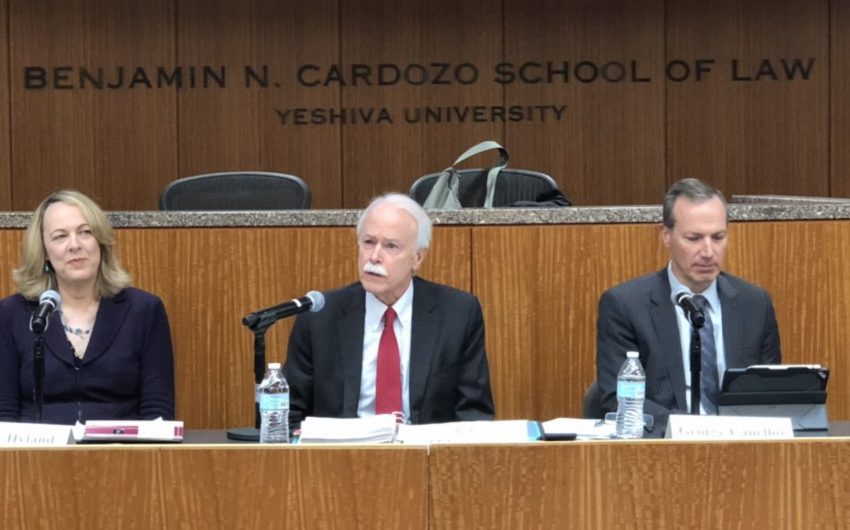
This year's Ethical Considerations for Corporate Lawyers was moderated by Adjunct Professor Mike Stone, who is also the director of compliance at the Samuel and Ronnie Heyman Center on Corporate Governance. Corporate lawyers with a mix of specializations, including entertainment law, civil law and white-collar law, discussed common challenges in ethics in today's legal landscape. The panel was sponsored by the Samuel and Ronnie Heyman Center on Corporate Governance, the Jacob Burns Center for Ethics in the Practice of Law and the Fordham Law School’s Stein Center for Law and Ethics.
Nicole Hyland, partner at Frankfurt Kurnit Klein & Selz, discussed the issue of limited scope and unbundling of representation with Bruce Green, a professor at Fordham Law School.
Green discussed the rule on limiting the scope of a legal representation and how it applies in different contexts. He explained that with the client’s informed consent, it is generally permissible to omit services that a lawyer would ordinarily perform, such as a title search in a real estate transaction. He also identified situations where the rule does not allow lawyers to limit their representation because the services performed would not be of value and might even prejudice the client.
"The question becomes: Is limiting the scope of representation reasonable?" Green said.
The panelists discussed consent to limit the representation in business transactions.
Green and Hyland gave the example that representing both the buyer and seller, although creating a conflict of interest, is sometimes allowed if the lawyer’s work is limited to serving as a “scrivener," just documenting the deal, and not negotiating or advocating for either client.
"That's when you need this heightened form of consent," Hyland said. She added that the rule of confidence and diligence still applies when you are hired as the local counsel.
Laura Schisgall, general counsel at Societe Generale Americas, said the rules aren't written specifically for in-house counsel.
Stone posed a question to the panelists concerning when a lawyer makes a lateral move inside or outside of their firm. "What are the responsibilities of a lateral attorney for possible conflicts?" Stone asked.
Hyland often represents lateral lawyers when they are switching firms. She said the duty of confidentiality often comes up in conflicts.
"Can they disclose who their clients are?" Hyland said, pointing out the conflicts clients face when moving from firm to firm. She said potential candidates shouldn't have to reveal their clients to a firm until the firm is serious about hiring them. "The timing is important," Hyland added.
She said another problem is not going back far enough in the lawyer's records when trying to clear a conflict, adding that it should be at least three years.
"It's sort of garbage in, garbage out," Hyland said.
Stone also started a discussion regarding the difference between legal and business advice, pointing out that when giving business advice, no one is protected by the attorney-client privilege.
George Canellos, a partner at Milbank Tweed Hadley & McCloy, said he hasn't seen the courts clearly define what is legal. "There's a very, very nebulous standard," he said. Canellos added that the courts have generally expanded the attorney-client privilege.
Hyland summed up the challenges of ethical conflicts for lawyers: "We're not expected to be perfect, we're expected to be reasonable."
